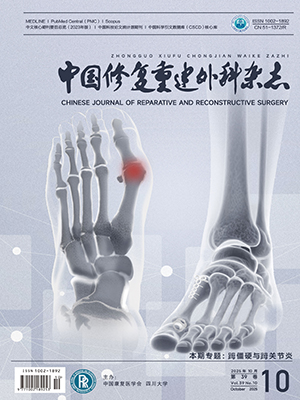Objective To study the effect of recombinant lentiviral vector mediated human hepatocyte growth factor (hHGF) gene-modified bone marrow mesenchymal stem cells (BMSCs) on the immunological rejection after allograft l iver transplantation in rats, and to reveal the mechanism of immune tolerance. Methods Eight male Sprague Dawley (SD)
rats of clean grade (aged 3 to 4 weeks, weighing 75-85 g) were selected for the isolation and culture of BMSCs; 64 adult male SD rats of clean grade (weighing 200-250 g) were used as donors; and 64 adult male Wistar rats of clean grade (weighing 230-280 g) were used as receptors. After establ ishing a stable model of rat allogeneic l iver transplantation, 1 mL sal ine, 2 ×106/mL of BMSCs 1 mL, 2 × 106/mL of BMSCs/green fluorescent protein 1 mL, and 2 × 106/mL of BMSCs/hHGF 1 mL were injected via the portal vein in groups A, B, C, and D respectively. Then the survival time of the rats was observed. The hepatic function was determined and the histological observation of the l iver was performed. The hHGF mRNA expression was detected by RT-PCR, the level of cytokine including hHGF, interleukin 2 (IL-2), IL-4, IL-10, and interferon γ (IFN-γ) by ELISA assay, the level of apoptosis by TUNEL method, and the expression level of prol iferating cell nuclear antigen (PCNA) by immunohistochemical method. Results The survival time of group D was significantly higher than that of groups A, B, and C (P lt; 0.01); the survival time of groups B and C was significantly higher than that of group A (P lt; 0.01), but there was no significant difference between group B and group C (P gt; 0.05). RT-PCR demonstrated the transcription of hHGF mRNA in the grafts of group D; the serum cytokine hHGF reached to (6.2 ± 1.0) ng/mL. Compared with groups B and C, group D exhibited significant inhibitory effect, significantly improved l iver function, and showed mild acute rejection. In addition, the levels of cytokine IL-2 and IFN-γ decreased; the levels of cytokine IL-4 and IL-10 increased; the level of apoptosis reduced; and the expression level of PCNA increased. Except for the expression of IL-4 (P gt; 0.05), there were significant differences in the other indexes between group D and groups B, C (P lt; 0.05). Conclusion BMSCs/hHGF implanting to rat l iver allograft via portal vein can induce immune tolerance. Compared with injection of BMSCs alone, BMSCs/hHGF treatment can alleviate acute rejection and prolong the survival time significantly. The immunosuppressive effect of BMSCs/hHGF is correlated with Th2 shifts up of Th1/Th2 shift, reduced apoptosis, promoted l iver regeneration.
Citation: ZHU Jinhai,CHEN Yanling.. EFFECT OF HUMAN HEPATOCYTE GROWTH FACTOR GENE-MODIFIED BONE MARROW MESENCHYMAL STEM CELLS ON IMMUNOLOGICAL REJECTION AFTER ALLOGRAFT LIVER TRANSPLANTATION IN RATS. Chinese Journal of Reparative and Reconstructive Surgery, 2011, 25(7): 871-876. doi: Copy
Copyright © the editorial department of Chinese Journal of Reparative and Reconstructive Surgery of West China Medical Publisher. All rights reserved




